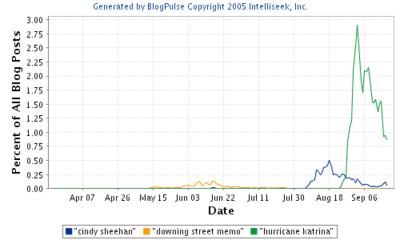I wrote recently on the New York Times’s new TimesSelect program (Aside: why on earth did the Times pick two words that end and start with the same letter for the name?) but after reading Jay Rosen’s thought-provoking and comprehensive post on the matter, I feel more is necessary.
One of the main points in the posting is that charging for opinion columns makes no sense since one non-governmental figure's views on something are worth(less) as much as the next informed person's, thus, no one would be inclined to pay for them.
To me, this idea is based on the theory that most people care more about what one ought to think about the news rather than what it really and truly is. That’s perfectly natural considering that no one has the time to try and find out everything about every story.
At this point, the best way a news medium can deliver on this expectation is through an opinion piece or in a toned down “news analysis,” since like their publics, they, too have limited resources to discover what’s really happening.
This is why the opinion columns in newspapers (whether about sports, news, politics, or the party scene) are what keeps people reading. News consumers come back for more because they expect not only good information but the manner in which it is delivered. It’s also the primary reason why blogs have become so popular so rapidly in this country but not in others with similar internet penetration. (The
Talk radio, Fox News Channel, and blogging have been the ways in which this public desire for more zesty news coverage have been met. That isn’t to say that the “new media” are all that profound, though. Most blogs don’t produce much that’s of great value, especially since the plurality of them seem to be written by people under 20 who comment on their daily experiences. Similarly, the missing-white-girl-obsessed Fox News and the johnny-one-notes of talk radio usually don’t provide perspicacious analysis or engage in superb investigative reporting (not to say they can’t).
What the new media do provide is a means to facilitate discussion. Agree or disagree, getting your news from someone who admits to being a human being is far more engaging and entertaining than listening to broom-up-the-ass talking heads who insist that not only do they not have opinions, even if they did, they’d never allow them to intrude into their reporting.
Statistical studies bear this conclusion out. In a survey released last June, the
Among people who follow so-called hard news heavily, 43 percent said they like news that shares their viewpoint compared to just 13 percent among those with low interest.
More than likely, the TimesSelect program is based on the above concepts.
This may seem odd at first since the arguments I just mentioned are points used by critics of TS. The commonplace nature of opinion is just the thing that the dominant Times faction seems to be banking on--except in their minds, the expectation is that the public not only wants to know what others think about sports, news, and politics; it also will place a premium on the opinions of the newspaper’s reliable, accurate, and bemusing columnists.
That’s a gamble in my view even though it’s certainly true that a fairly large number of people--the types who believe every word the Times publishes with the exception of 65 percent of every David Brooks column. The trouble for the Times, though, is that this group of people is an ever-shrinking number of people.
This leads me to wonder: What if TimesSelect (especially the part where columnists will interact with subscribers) is actually just a deal sweetener to get people to subscribe to the paper’s archives? A ham-fisted concession to the idea of information communities?
If that’s what TimesSelect is, I think the idea could have some merit if the cost-benefit ratio were a bit more lucrative for the customer and more enticing for the window-shopper.
Not only should the Times allow today’s columns to be available tomorrow, as Doc Searls suggests, the paper should allow subscribers to see tomorrow’s news today (and not just Sunday’s as it is at present). An expansion of the public editor’s office to include a “subscribers’ advocate” might also prove attractive, especially since current public editor Byron Calame is perpetually overwhelmed with queries.
Another valuable asset for TimesSelect subscribers might be the idea of user-controlled blogs, from which the paper might draw during times of breaking news as some media outlets did during the London Underground attacks. TimesSelect may also prove useful as a breeding ground for an NYT foray into internet television.
With some modifications, I think TimesSelect could be made more likely to succeed. In its present form (and present price), I don’t think it’s worth much for the people who are inclined to pay for online news services.
In most of the analysis on the subject that I’ve seen, the discussion seems to assume that a news source should either be fully free or entirely subscriber based and not a free/pay hybrid. I disagree. A hybrid site which is “free plus extras” can succeed as WSJ.com/OpinionJournal.com and RushLimbaugh.com have shown. Limbaugh’s site has been profitable from day one while the Journal’s has been profitable for the past few years.
